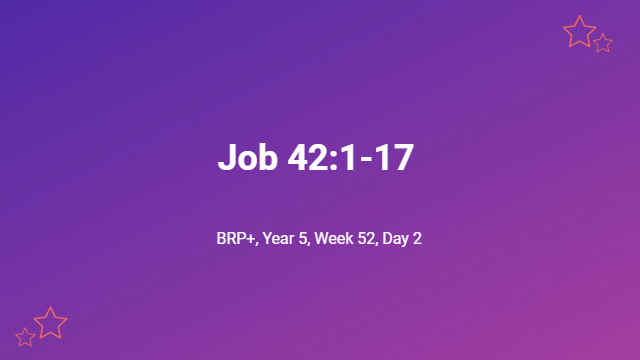Job 42:1-17
Q.1. What conclusion did Job’s suffering lead him to? How had his confrontation with God changed his view? What was Job’s attitude? What did this say about God, confirming that He never needs to retract anything He has said or done? – (Job 42:1-6)
God had charged Job with commenting about things beyond his knowledge (Job 38:2-3). After his encounter with God, Job accepted – I know that You can do all things, and that no purpose of Yours can be thwarted (Job 42:2). We can easily recite statements about God’s sovereignty. However, it is an altogether different thing to accept it in experience, as Job was now confessing. Though God has accepted the questions and complaints of great saints like Moses and Elijah, we must recognize the foolishness of doing this – On the contrary, who are you O man who answers back to God? The thing moulded will not say to the moulder – Why did you make me like this? (Rom.9:20). Through grappling with the great issues of life while suffering, Job had his eyes opened, and now factored God into all his circumstances – Therefore I retract and I repent in dust and ashes (Job 42:6 c.f. Job 42:4-5). We learn that peace comes from being right with God, regardless of the situation we are in (c.f. Phil.4:11). Hardly a day goes by when we don’t face the foolishness of our thoughts, words, and deeds. This God has never had to do, nor will He ever have to retract or modify what He has said or done.
Q.2. How did God view the comments of Job’s three friends? Why was Elihu not included? How could Eliphaz and his friends avoid God’s wrath? Whom did God invite to preside over the sacrifices? What was the condition of his restoration? How much did God bless the suffering Job? – (Job 42:7-10)
The audience that Eliphaz, the Temanite, had with God was much briefer than Job’s – … My wrath is kindled against you and against your two friends, because you have not spoken of Me what is right as My servant Job has (Job 42:7). The younger Elihu was not included in the rebuke. Perhaps God made allowances for his inexperience. God commanded Eliphaz and his friends to bring Him a substantial sacrifice of seven bulls and seven rams. They were also to restore their esteem for Job – … and My servant Job will pray for you. For I will accept him so that I may not do with you according to your folly, because you have not spoken of Me what is right, as My servant Job has (Job 42:8). Twice God differentiated Job’s righteousness with theirs (Job 42:7-8) – although he did not totally exonerate Job (i.e. the greatest saints, including Job, are all sinners). When the three men obeyed, Job’s trial ended and his countenance was lifted up – the Lord accepted Job (Job 42:9). God blessed Job when he was willing to pray for his ‘tormentors’ – The Lord restored the fortunes of Job when he prayed for his friends, and the Lord increased all that Job had twofold (Job 42:10). It is a great secret weapon, to pray for our enemies. This results in peace, and God’s approval and blessing.
Q.3. What made the family of Job bless him? How much did God bless the latter days of Job’s life? Why did God not double the numbers of his children? Why were the names of the daughters of Job given? Can we claim God’s blessing on our extended family? – (Job 42:11-17 c.f. Job 1:1-4)
It took Divine intervention and a change of heart, for Job’s family to interact with him again (Job 42:11). Many people do not know how to respond to suffering, or to the sufferer. This can intensify our suffering. There are some valleys that we are called to travel alone. God did indeed bless Job’s latter days twofold. We discover that all Job’s initial bounty was doubled (Job 42:12 c.f. Job 1:1-4). Why did God not give him double the number of children? This reminds us that humans are not just animals. We have a future beyond this life. Though Job’s seven sons and three daughters all died tragically, they were not annihilated, but have a future (Job.1:2, 18-19 c.f. Jn.5:24-29)! Of his seven children, only his daughters were named. It was testified of them, that – In all the land no women were found so fair, as Job’s daughters; and their father gave them inheritance among their brothers (Job 42:15). God alone holds the keys to death and Hades. However, who we are will impact our children and their children. In the case of the godly Job, his legacy was more valuable than wealth (Job 42:16-17 c.f. Rev.1:18).

